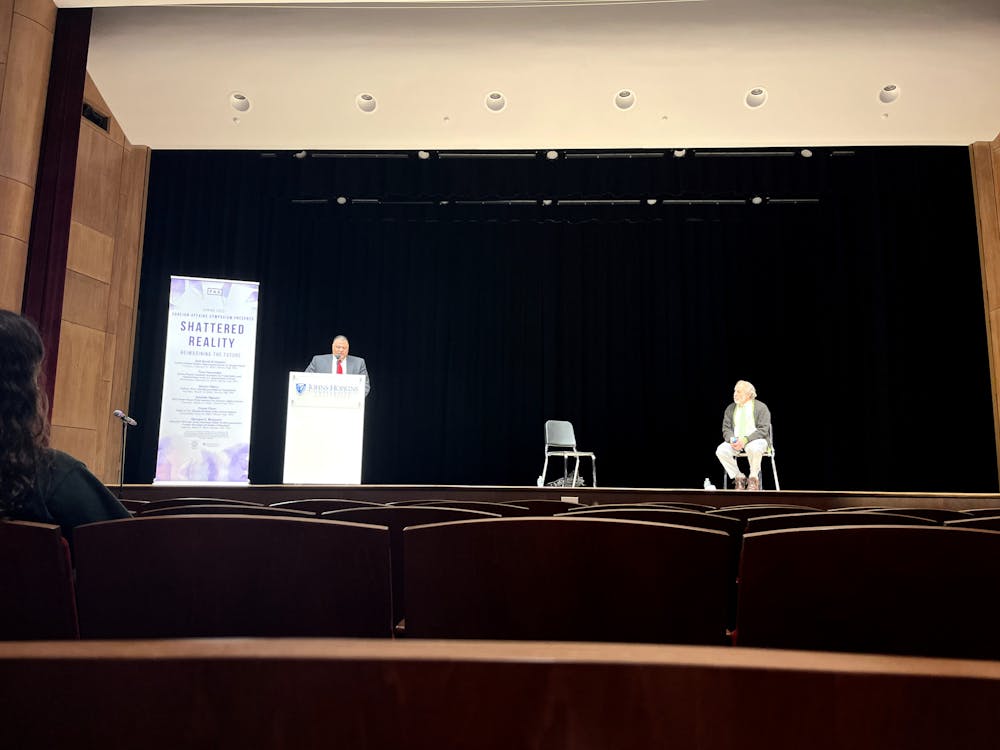The Foreign Affairs Symposium (FAS) hosted career foreign service officer Tony Fernandes to discuss his work on Feb. 23.
The event was the second of six events in this year’s “Shattered Reality: Reimagining the Future” symposium series. FAS Co-executive Directors Daphne Tang and Maiss Mohamed organized the event and Robert Barbera, the director of the Center for Financial Economics, moderated the discussion with Fernandes.
In an email to The News-Letter, Tang explained how Fernandes fit into the 2022 symposium’s theme.
“Since economic shocks, especially from the COVID-19 pandemic and trade disputes, have negatively impacted people's lives, we wanted a government speaker who could share the policy perspective on how to recover,” she wrote.
Fernandes, who currently serves as the acting deputy assistant secretary for trade policy and negotiations, has worked at the U.S. Department of State for over 20 years. Fernandes explained that his current position places him in the middle of global trade issues, including supply-chain disruptions and the reduction of barriers to free trade.
Fernandes described how this work at Department of State fits into U.S. foreign policy from a historical perspective.
“We’ve been moving forward for several decades,” he said. “Tariffs have come down and the world is looking at an even wider variety of bilateral and multilateral agreements to reduce tariff and non-tariff barriers to let the, quote, ‘rising tide of increased trade lift all boats’ — that’s an important part of my work.”
Tang also explained how this background supported the symposium’s goal of bringing diverse viewpoints to campus.
“We believe that these discussions are important because we normally approach these issues from an academic perspective, perhaps with economic theory, in school,” she wrote. “However, Mr. Fernandes gave us the perspective of somebody working firsthand on policymaking, which would push us to think about how what we learn in our classes extends to the real world.”
In an email to The News-Letter, freshman Jamie Huynh expressed her appreciation for the perspective Fernandes was able to bring to the University because of his role in the Department of State. She asserted she had found attending the event worth it despite being busy with midterms.
Throughout the moderated and unmoderated portions of the event, Fernandes elaborated upon the economic impacts of the pandemic, explaining that understanding the extent of these impacts begins with understanding the just-in-time processes that have governed global supply chains in recent decades.
He also identified lessons the U.S. government has taken from the pandemic.
“We’ve really learned that we have to work together with other countries; we have to work with Canada, with Mexico, we have to work with the EU,” he said. “We all have, I think, the opinion that this isn’t the last time that we’re going to have a shock. I hope it is not as bad as this pandemic for another hundred years, but it's possible something else could happen in five, 20 years, and we want to be better prepared.”
Freshman Lucas Holloway, a member of the FAS programming committee, commented on Fernandes’ outlook on U.S. economic recovery in an email to The News-Letter.
“Things will not be fixed overnight, but it's good to see that our government is being pragmatic in this regard,” he wrote. “Yet, I also liked Mr. Fernandes' belief in a better future and his hope that we as a nation can learn from our mistakes of the pandemic to be better situated if and when any future crises arise.”
At the end of the Q&A portion, Hernandes reiterated his office’s commitment to rectifying the current supply-chain crisis. He also emphasized their commitment to facilitating global trade while mitigating some of the negative effects that were brought up during the event, including an increased carbon footprint and a limited ability to enforce compliance with trade pledges.
In an email to The News-Letter, Mohamed explained the vision the FAS has for the rest of this year’s symposium series.
“As the series continues, we hope to see continued engagement from Hopkins students and faculty, but also from the larger Baltimore community," she said. “We look forward to hearing the questions and concerns our students have for our experts and seeing the impacts that this open dialogue has on our campus.”
Huynh highlighted that she has made it a goal to attend speaker events whenever possible this semester.
“[These events] really allow students a chance to learn more from the people that have been through the challenges of it all,” she wrote. “It also teaches us more critical views about the world that we may not have developed ourselves or learned from professors — and being able to attend live additionally fosters any curiosity built on those newly found points of view. Or we could just be simply inspired — and that’s sometimes sufficient to keep us going.”





